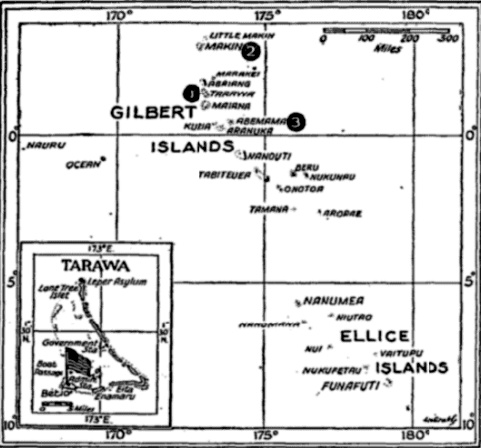Memorandum by the U.S. Chiefs of Staff
Cairo, 25 November 1943
CCS 408
Secret
Command of British and U.S. forces operating against Germany
- Current operations in the war against Germany and those approved for the immediate future are grouped geographically and functionally into three categories:
a. Operations in the Mediterranean area involving combined forces with land, sea, and air components.
b. Operations in the northwestern part of Europe, also involving combined forces with land, sea, and air components.
c. Operations against interior Germany involving combined strategic air forces based both in the Mediterranean area and in northwestern Europe.
-
Each of these operations is an entity requiring unity of command over the forces which are engaged.
-
These operations are all intimately related to each other, with a common, overall objective – Defeat of Germany. Events in the Mediterranean area attract enemy forces and affect enemy capabilities, which in turn have an important bearing upon our capabilities in northwestern Europe, and vice versa. Strategic air operations against interior Germany strongly affect our capabilities in both areas. Furthermore, the flexibility of the strategic air forces permits their employment in varying degree to assist the Allied forces in either area.
-
The United States Chiefs of Staff now consider that the war in Europe has reached a stage where the necessity for command direction over all these forces, in conformity with general directives of the Combined Chiefs of Staff, is clearly indicated. This command should be vested in a single commander, and he should exercise command over the Allied force commanders in the Mediterranean, in northwest Europe, and of the strategic air forces. The immediate appointment of this commander is, in our opinion, most urgently necessary. Even if he is appointed now, it is improbable that he will be able to organize his staff and begin to function before the end of January 1944. The situation which may develop in Europe by that time requires a more positive overall command arrangement than that now functioning under the Combined Chiefs of Staff. Any delay in setting up such a command may lead to confusion and indecision at a critical time, thus delaying the attainment of early victory in Europe.
-
In matters pertaining to strategic bombing, it is imperative that unified Allied command be established. The rapidity with which decisions regarding air operations must be made demands command control, as opposed to general directives or occasional direct action by the Combined Chiefs of Staff. We cannot escape the responsibility for adopting every means known to us to save the lives of our men and the planes they fly. The one effective method is to insure the rapid coordinated employment, on a day-to-day operational basis, of the United States Air Forces in both the U.K. and Mediterranean by day and RAF bomber units by night in order to obtain the maximum dispersion of enemy air and anti-aircraft defense, and to take the greatest possible advantage of weather conditions in both theaters. This unified command must, therefore, be established without delay and must embrace all the strategic air forces engaged against Germany, including the United States Eighth and Fifteenth Air Forces and the British Bomber Command.
-
The British Chiefs of Staff have proposed the establishment of unified command in the Mediterranean area. We are in accord with this proposal, with the proviso that the U.S. Fifteenth Air Force should be specifically excepted and commanded as in paragraph 5 above.
-
The United States Chiefs of Staff propose to the British Chiefs of Staff:
a. That a Supreme Commander be designated at once to command all United Nations operations against Germany from the Mediterranean and the Atlantic under direction from the Combined Chiefs of Staff.
b. That an overall commander for northwestern European operations be appointed, under the Supreme Commander.
c. That a strategic air force commander be appointed, under the Supreme Commander, to exercise command over the U.S. Eighth and Fifteenth Air Forces and the British Bomber Command.
d. That the Commander of the Allied Forces in the Mediterranean shall come under the Supreme Commander.
- The United States Chiefs of Staff further propose that the Supreme Commander be directed to carry out the agreed European strategy, and
a. Be charged with the location and timing of operations;
b. Be charged with the allocation of the forces and materiel made available to him by the Combined Chiefs of Staff; and
c. That his decisions on the above questions be subject to reversal by the Combined Chiefs of Staff.
